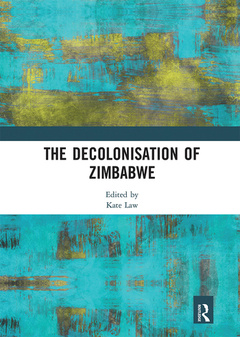The Decolonisation of Zimbabwe
Coordonnateur : Law Kate

Rhodesia?s illegal Unilateral Declaration of Independence (UDI) in 1965 is an act that not only shaped regional politics but also had a profound effect on Britain?s attempt to retreat from its empire. This edited collection brings together leading voices in the field, whose contributions ? on the role of finance, ?big business?, and the regional and international actors involved in the country?s negotiated independence ? update long-held historiographical wisdoms, signalling a revival in economic and diplomatic explanations for the country?s decolonisation. In particular, they shed fresh light on the role(s) played in the decolonisation of Zimbabwe by economic (private business) and political (liberation movements, Western and Southern African governments) actors that until now have been studied with very limited access to primary sources.
As scholarship on Zimbabwe is currently dominated by studies that seek to understand the ?crisis? in which the country has recently found itself, this collection acts as a clarion call that reinforces the importance of studies of earlier historical processes. In doing so, the book provides a more nuanced understanding of the continuities and discontinuities between Zimbabwe?s colonial and postcolonial history, and examines the roles played by external governments and individuals in the decolonisation of Zimbabwe. This book was originally published as a special issue of The Journal of Imperial and Commonwealth History.
Introduction – Pattern, Puzzle, and Peculiarity: Rhodesia’s UDI and Decolonisation in Southern Africa1. Globalisation and Decolonisation2. Money, Banking and Rhodesia’s Unilateral Declaration of Independence3. Big Business and White Insecurities at the End of Empire in Southern Africa, c.1961–19774. Tanzania and the 1976 Anglo-American Initiative for Rhodesia5. The Anglo-American and Commonwealth Negotiations for a Zimbabwean Settlement between Geneva and Lancaster, 1977–19796. Race and Policy: Britain, Zimbabwe and the Lancaster House Land Deal
Kate Law is a NRF fellow at the University of Nottingham, UK, and Research Fellow in the Centre for Africa Studies at the University of Free State, South Africa. She is currently writing a monograph about the social history of Depo-Provera during apartheid.
Date de parution : 09-2020
17.4x24.6 cm
Date de parution : 12-2018
17.4x24.6 cm
Thèmes de The Decolonisation of Zimbabwe :
Mots-clés :
Secretary Of State; Southern Rhodesia; The Journal of Imperial and Commonwealth History; Lancaster House Negotiations; Harold Wilson; Zimbabwean Nationalist; Lancaster House deal; ZANU; globalisation; Lancaster House; southern Africa; Patriotic Front; British Empire; Zimbabwe Rhodesia; decolonisation; Zimbabwe; Ian Smith; Rhodesia’s UDI; Unilateral Declaration of Independence; ZANU PF; Sterling Area; Rhodesia; British Government; Rhodesia's illegal Unilateral Declaration of Independence; Zimbabwean Liberation Struggle; country's decolonisation; Anglo-American Initiative; regional politics; ZIPA; RF Government; Transitional Government; Constitutional Conference; Front Line Presidents; Kenyan Model; Geneva Conference; Accept Majority Rule; ZAPU Leader; Military Fiscal State



